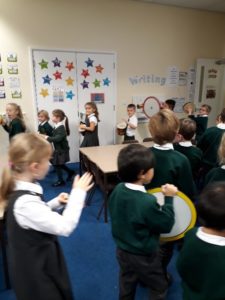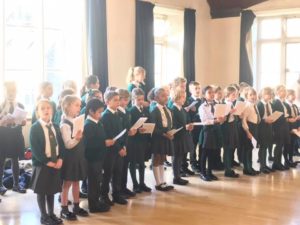 At St. Joseph’s Primary School, it is our intent that we make music an enjoyable, inclusive learning experience that will challenge and enrich. We encourage children to participate in a variety of musical experiences through which we aim to build up the confidence of all children, recognising the diverse backgrounds of all our families. Our teaching follows the Charanga music scheme and focuses on developing the children’s ability to understand rhythm and follow a beat. Through singing songs and playing musical instruments, both percussion and tuned, children learn about the structure and organisation of music. We teach them to listen and to appreciate different forms of music. Children develop descriptive language skills in music lessons when learning about how music can represent different feelings, emotions and narratives. We also teach technical vocabulary such as volume, pitch, beat and rhythm and encourage children to discuss music using these terms.
At St. Joseph’s Primary School, it is our intent that we make music an enjoyable, inclusive learning experience that will challenge and enrich. We encourage children to participate in a variety of musical experiences through which we aim to build up the confidence of all children, recognising the diverse backgrounds of all our families. Our teaching follows the Charanga music scheme and focuses on developing the children’s ability to understand rhythm and follow a beat. Through singing songs and playing musical instruments, both percussion and tuned, children learn about the structure and organisation of music. We teach them to listen and to appreciate different forms of music. Children develop descriptive language skills in music lessons when learning about how music can represent different feelings, emotions and narratives. We also teach technical vocabulary such as volume, pitch, beat and rhythm and encourage children to discuss music using these terms.
Implementation
The music curriculum ensures students sing, listen, play, perform and evaluate. This is embedded in the classroom activities as well as the weekly singing assemblies, various concerts and performances, the learning of instruments, and the joining of choir. The elements of music are taught in the classroom lessons so that children are able to use some of the language of music to dissect it, and understand how it is made, played, appreciated and analysed and in doing so understand the different principle of each method of creating notes, as well as how to read basic music notation. They also learn how to compose focussing on different dimensions of music, which in turn feeds their understanding when listening, playing, or analysing music. Composing or performing using body percussion and vocal sounds is also part of the curriculum, which develops the understanding of musical elements without the added complexity of an instrument.
Impact
Whilst in school, we try to provide the children with a varied programme, which allows students to discover areas of strength, as well as areas they might like to develop. The integral nature of music and the learner creates an enormously rich palette from which a student may access fundamental abilities such as: achievement, self-confidence, interaction with and awareness of others, and self-reflection. Music will also develop an understanding of culture and history, both in relation to students individually, as well as ethnicities from across the world. Children are able to enjoy music, in as many ways as they choose- either as listener, creator or performer.
Music for the Soul Concert with Orchestra Pro Anima Recording

Rehearsing the music for the Rio Carnival!

Our choir visiting the local community, bringing a ray of sunshine to the local nursing home.



